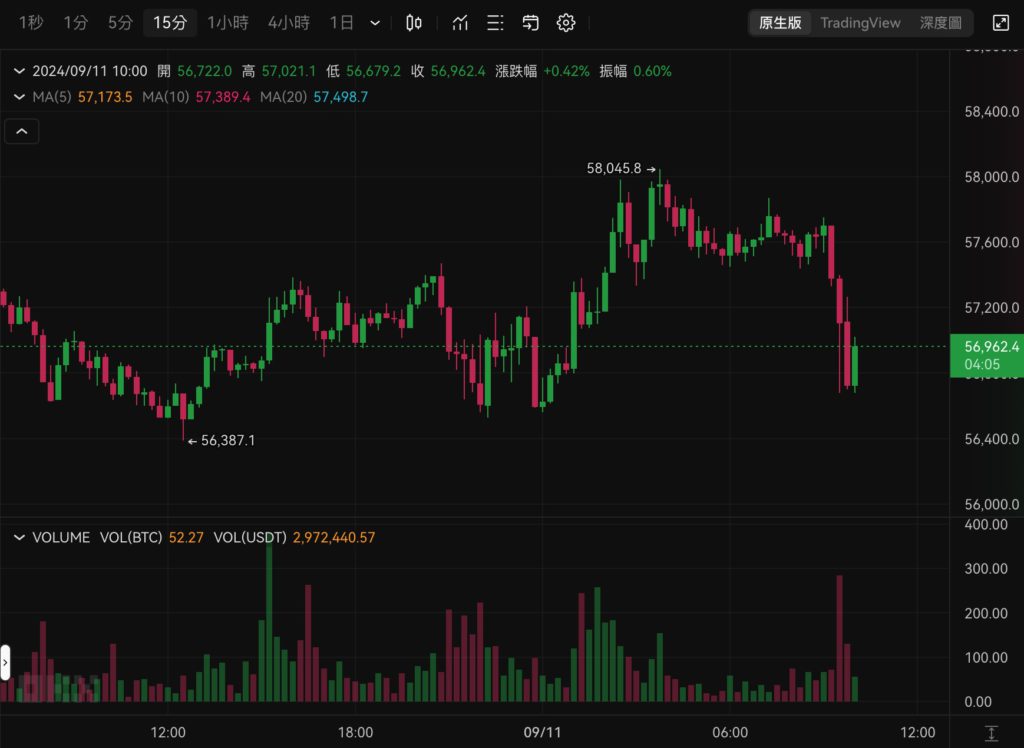Bitcoin fell back after breaking through $58,000 yesterday. After fluctuating and accumulating strength above $56,000, it broke through $58,000 again after three o'clock in the morning on the 11th. However, selling pressure soon emerged again, and after nine o'clock Ushered in a rapid decline and fell below $57,000.
At the time of writing, it was trading at US$56,962, with the increase in the past 24 hours narrowing to 0.54%.

Three major U.S. stock indexes rise
As for U.S. stocks, except for the Dow Jones Industrial Index, which closed slightly on the 10th, the other three major indexes all rose:
- The Dow Jones Industrial Average fell 92.63 points, or 0.23%, to close at 40,736.96 points
- The S&P 500 index edged up 24.47 points, or 0.45%, to close at 5,495.52 points.
- The Nasdaq rose 141.28 points or 0.84% to close at 17025.88 points
- The Philadelphia Semiconductor Index rose 54.89 points or 1.19% to close at 4680.67 points
Is Japan’s interest rate increase at the end of the year an unexploded bomb in the market?
Although the stock market has gradually stabilized after the sharp decline in August and is expected to rise after September and October, the nightmare of yen arbitrage unwinding is not over yet. In the past two weeks, various Japanese economic data have performed better than expected. In June, residents' real income returned to positive levels for the first time in 27 months, and domestic demand picked up in the second quarter, giving the Bank of Japan the confidence to "continue to raise interest rates."
In this regard, Tomoko Amaya, executive consultant of Norinchukin Research Institute and former senior official of the Japan Financial Services Agency, said:
Although the market has experienced some turmoil in the past month or two, I don't think the market has lost confidence. The market has now regained enough stability that the Bank of Japan is still likely to raise interest rates this year, which would benefit banks.
Most Bank of Japan watchers also believe that the central bank will raise interest rates again in January if the market is not as unstable as it was in early August.
Morgan Stanley: Yen arbitrage unwinding disaster may happen again
It is almost certain that the US Federal Reserve (Fed) will officially launch an interest rate cut at this month's FOMC meeting, and the focus of market discussion has shifted to whether to cut interest rates by 1 or 2 points.
Against this background, Michael Wilson, a strategist at Wall Street investment bank Morgan Stanley, said that if the Fed cuts interest rates sharply at the beginning of this month, it may once again trigger the disaster of yen arbitrage liquidation:
If the Fed cuts interest rates significantly this month, U.S. stocks may face the risk of further unwinding of yen carry trades. An initial rate cut of more than 25 basis points could strengthen the yen further, which would prompt yen traders to withdraw from U.S. assets as domestic interest rates rise, and global markets could repeat a turbulent pattern.
Kathy Lien, managing director of foreign exchange strategy at BK Asset Management, also said that the unwinding of yen carry trades is expected to continue in September, bringing the risk of another large-scale sell-off.
Bank of Japan: There is little need to raise interest rates next week
It remains to be seen whether the Bank of Japan will continue to raise interest rates, but according to Bloomberg , Bank of Japan officials believe there is little need to raise the benchmark interest rate when they hold an interest rate meeting next week because they are still paying attention to the lingering shocks in financial markets. , and the impact of the July interest rate hike.
People familiar with the matter said the Bank of Japan is likely to keep interest rates unchanged at 0.25% at the end of its two-day policy meeting on September 20, given the recent market turmoil, including the Nikkei 225 index's decline on August 5 (i.e., the central bank's (just days after raising interest rates) recorded its largest fall on record, central banks need to monitor financial markets carefully.







